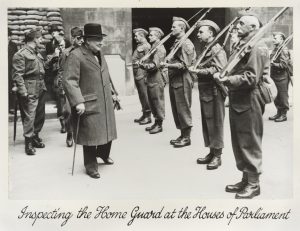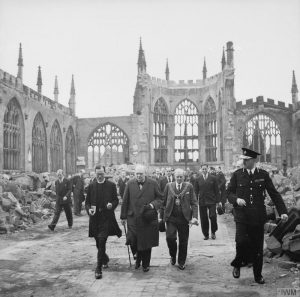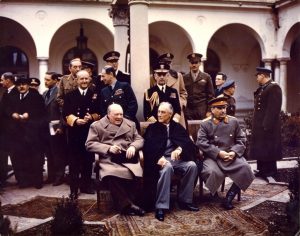
Finest Hour 171
Winston Churchill: In His Own Words

Winston Churchill, Parliament Square, London © Sue Lowry & Magellan PR
March 20, 2016
Finest Hour 171, Winter 2016
Page 50
The River War: Churchill’s Firsthand Account of the Charge at Omdurman
Lines printed in bold italics appeared in the first edition of The River War but not in later editions.
As the 21st Lancers left the ridge, the fire of the Arab riflemen on the hill ceased. We advanced at a walk in mass for about 300 yards. The scattered parties of Dervishes fell back and melted away, and only one straggling line of men in dark blue waited motionless a quarter of a mile to the left front. They were scarcely a hundred strong. I marvelled at their temerity. The regiment formed into line of squadron columns, and continued at a walk until within 300 yards of this small body of Dervishes. I wondered what possessed them. Perhaps they wanted to surrender. The firing behind the ridges had stopped. There was complete silence, intensified by the recent tumult. Far beyond the thin blue row of Dervishes the fugitives were visible streaming into Omdurman. And should these few devoted men impede a regiment? Yet it were wiser to examine their position from the other flank before slipping a squadron at them. The heads of the squadron wheeled slowly to the left, and the Lancers, breaking into a trot, began to cross the Dervish front in column of troops. Thereupon and with one accord the blue-clad men dropped on their knees, and there burst out a loud, crackling fire of musketry. It was hardly possible to miss such a target at such a range. Horses and men fell at once. The only course was plain and welcome to all. The Colonel, nearer than his regiment, already saw what lay behind the skirmishers. He ordered ‘Right wheel into line’ to be sounded. The trumpet jerked out a shrill note, heard faintly above the trampling of the horses and the noise of the rifles. On the instant all the sixteen troops swung round and locked up into a long galloping line, and the 21st Lancers were committed to their first charge in war.

2024 International Churchill Conference
Two hundred and fifty yards away the dark-blue men were firing madly in a thin film of light-blue smoke. Their bullets struck the hard gravel into the air, and the troopers, to shield their faces from the stinging dust, bowed their helmets forward, like the Cuirassiers at Waterloo. The pace was fast and the distance short. Yet, before it was half covered, the whole aspect of the affair changed. A deep crease in the ground—a dry watercourse, a khor—appeared where all had seemed smooth, level plain; and from it there sprang, with the suddenness of a pantomime effect and a high-pitched yell, a dense white mass of men nearly as long as our front and about twelve deep. A score of horsemen and a dozen bright flags rose as if by magic from the earth. Eager warriors sprang forward to anticipate the shock. The rest stood firm to meet it. The Lancers acknowledged the apparition only by an increase of pace. Each man wanted sufficient momentum to drive through such a solid line. The flank troops, seeing that they overlapped, curved inwards like the horns of a moon. But the whole event was a matter of seconds. The riflemen, firing bravely to the last, were swept head over heels into the khor, and jumping down with them, at full gallop and in the closest order, the British squadrons struck the fierce brigade with one loud furious shout. The collision was prodigious. Nearly thirty Lancers, men and horses, and at least two hundred Arabs were overthrown. The shock was stunning to both sides, and for perhaps ten wonderful seconds no man heeded his enemy. Terrified horses wedged in the crowd; bruised and shaken men, sprawling in heaps, struggled, dazed and stupid, to their feet, panted, and looked about them. Several fallen Lancers had even time to remount. Meanwhile the impetus of the cavalry carried them on. As a rider tears through a bullfinch, the officers forced their way through the press; and as an iron rake might be drawn through a heap of shingle, so the regiment followed. They shattered the Dervish array, and, their pace reduced to a walk, scrambled out of the khor on the further side, leaving a score of troopers behind them, and dragging on with the charge more than a thousand Arabs. Then, and not till then, the killing began; and thereafter each man saw the world along his lance, under his guard, or through the back-sight of his pistol; and each had his own strange tale to tell.
Subscribe
WANT MORE?
Get the Churchill Bulletin delivered to your inbox once a month.




